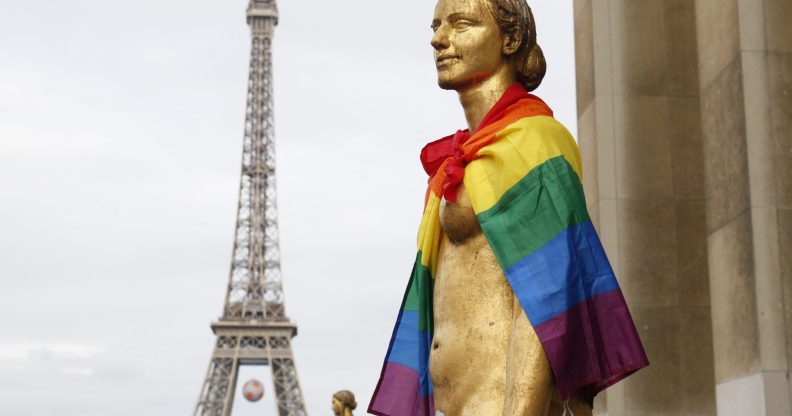French parliament votes to protect LGBT asylum seekers from persecution

(Getty)
The French parliament’s legislative committee has voted almost unanimously for a measure to protect LGBT asylum seekers from deportation if they stand to face punishment for their sexuality in their home country.
The amendment, initially put forward by around 50 members of parliament from President Emmanuel Macron’s La République en Marche party (Republic on the Move), was passed by France’s lower house, the Assemblée nationale.
The proposed change seeks to exclude countries that penalise homosexuality from France’s official list of safe countries of origin.
Under current law, asylum seekers who come to France from a country on this list can be deported through a fast-track system, even if they make an appeal, according to the Libération newspaper.
The amendment, tabled by La République en Marche MPs Elise Fajgeles and Matthieu Orphelin, seeks to remove nations “where homosexuality may be the target of mistreatment or criminal penalties” from this list of 16 “safe” countries.
India, Ghana and Senegal would be withdrawn under the proposed change.
If the amendment is passed by France’s Senate, migrants who come from countries which penalise same-sex relationships will be able to make an appeal to France’s National Court for the Right to Asylum if their asylum request is rejected, without risking deportation in the process.
Orphelin hailed the amendment as a step forward for LGBT rights. “How can we call countries which criminalise LGBT people “safe countries”?” he said, in comments reported by Libération.

People hold rainbow flags as they take part in the Pink Parade, the LGBT Pride celebration in Nice, southeastern France, on August 5, 2017. (AFP/Getty)
“Today, there are asylum seekers who come to our country because they have been persecuted for their sexual orientation.
“It was indispensable to change the definition of a safe country and to reiterate that there are only a handful of countries in the world where LGBT people are respected,” he added.
However, some refugee rights advocates said the amendment did not go far enough to protect LGBT asylum seekers.
The French NGO Cimade, which gives support to refugees, lauded the vote “as a good thing” for LGBT people who come from countries which will no longer be deemed “safe” under the amendment.
But, the organisation stated, other countries that may not have laws which forbid homosexuality, “are not necessarily more safe” for LGBT people, who may still suffer “rampant homophobia.”
Cimade called for the complete abolition of the safe countries list, arguing that once asylum seekers are put through the fast-track deportation system, they have fewer rights and their appeals are only heard by one judge rather than a body of magistrates.
Héloïse Mary, the president of the French organisation Baam, which also gives support to migrants, echoed these concerns, arguing that there are “many states” where homosexuality is not penalised, but LGBT people are nevertheless subjected to homophobic practices, such as “conversion therapies.”

